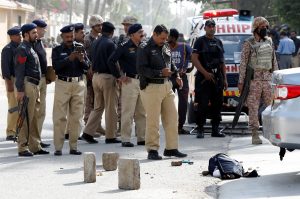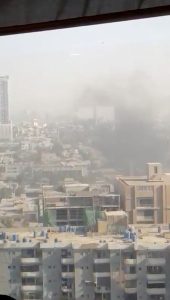
By Syed Raza Hassan
KARACHI (Reuters) – Three suicide attackers stormed the Chinese consulate in the Pakistani city of Karachi amid a series of gunshots and an explosion on Friday, but were killed before they could force their way in with a car packed with explosives, police said.
The attack, claimed by separatist insurgents from the impoverished southwestern Pakistani province of Baluchistan, killed four people, including two police, but it was far from the most deadly on a particularly violent day across the region.
A suicide attacker on a motorbike set off explosives in a crowded festival and market in northwest Pakistan’s Orakzai region, killing at least 25 people at around the same time as the Karachi bloodshed.
Over the border in eastern Afghanistan, a suicide blast at a mosque on an army base killed at least 26 people and wounded 50, security officials said. Earlier in the week, a suicide bomber killed 55 people in the capital, Kabul.
The blood-letting comes as faint hopes for peace in Afghanistan have been stirred by two meetings between U.S. special envoy Zalmay Khalilzad and the Taliban in Qatar.
U.S. President Donald Trump said on Thursday the United States was “in very strong” peace negotiations in Afghanistan but he did not know whether they would be successful.
The attack on China’s consulate in Karachi was claimed by the separatist Baloch Liberation Army (BLA) insurgent group that opposes Chinese projects linked to its Belt and Road initiative in resource-rich Baluchistan.

Police officers gather and take pictures of a bag with explosives with their cell phones, after an attack on the Chinese consulate, in Karachi, Pakistan November 23, 2018. REUTERS/Akhtar Soomro
Two policemen and two people waiting in a queue outside the consulate were killed in the attack, along with the three gunmen.
Pakistani Prime Minister Imran Khan called it “part of conspiracy” against Pakistani and Chinese economic and strategic cooperation and ordered an inquiry, his office said.
Pakistan has long accused its old rival, India, of supporting the nationalist insurgents in Baluchistan, while India accused Pakistan of nurturing Islamist militants throughout the region.
India denies helping the Baluchistan insurgents and was quick to condemn the violence.
“The perpetrators of this heinous attack should be brought to justice expeditiously,” India’s foreign ministry said in a statement.
India has for decades accused Pakistan of supporting Islamists fighting Indian security forces in the Indian part of the Himalayan region of Kashmir, where increasing violence flared again on Friday with Indian forces killing six militants in a clash.
India and the United States also accused Pakistan of supporting the Afghan Taliban. Pakistan denies that.

Smoke rises from the Chinese consulate after an attack by gunmen in Karachi, Pakistan, November 23, 2018 in this still image taken from a video obtained from social media. Saqib Zia/via REUTERS
‘EXPLOITING RESOURCES’
As the Karachi attack unfolded, an explosion and gunshots rang out in its affluent Clifton neighborhood and a plume of smoke rose over the area.
City police chief Amir Shaikh said the three attackers came in a car filled with explosives but failed to get inside the heavily fortified compound. It was not clear if the car had exploded.
“They tried to get inside, but the Rangers and police killed one of the terrorists,” Shaikh said.
A gun battle broke out with the two other attackers trying to enter the visa section, but they were also killed, he said.
A spokesman for the BLA confirmed there were three attackers.
“China is exploiting our resources,” spokesman Jiand Baloch told Reuters by telephone.
China has funded development of a deep-water port at Gwadar in south Baluchistan and is also investing in other projects on a China Pakistan Economic Corridor.
Baluchistan, which is on the borders of Afghanistan and Iran, has rich mineral and natural gas reserves but is Pakistan’s poorest province.
Separatists have for decades campaigned against what they see as the unfair exploitation of resources, in particular, natural gas and minerals.
The Chinese government’s top diplomat, Wang Yi, said he was “shocked” by the attack and urged Pakistan to prevent any more such incidents.
A Chinese foreign ministry spokesman said China would “continue unswervingly” to work with Pakistan to develop economic projects.
The suicide bomb attack in the Afghan border province of Khost came as people gathered for Friday prayers at the mosque on the army base.
The Taliban, who are waging a war to oust the Western-backed Afghan government and expel foreign forces, have launched a series of high-profile attacks against Afghan security forces in recent weeks.
The blast in Pakistan’s Orakzai region was also at a Friday festive gathering.
There was no claim of responsibility for either of those blasts.
(Additional reporting by Kay Johnson and Drazen Jorgic in ISLAMABAD, Rupam Jain in KABUL, Philip Wen in Beijing; Editing by Robert Birsel and Nick Macfie)
